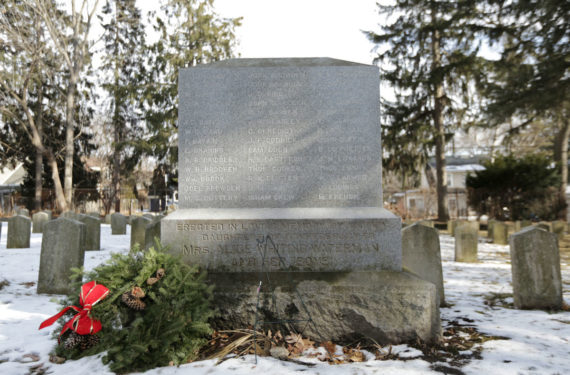
Yes, give me a land with a grave in each spot
And names in the graves that shall not be forgot;
Yes, give me the land of the wreck and the tomb–
There is grandeur in graves–there is glory in gloom[1]
And names in the graves that shall not be forgot;
Yes, give me the land of the wreck and the tomb–
There is grandeur in graves–there is glory in gloom[1]
During the War, Southern prisoners were held in nearby Camp Randall before being deposited into that Chicagoan horror, Camp Douglas. While at Camp Randall, some of the men succumbed to illness and injury, ultimately ending their whittled and weakened days in that sad spot in Wisconsin. These one hundred forty Southerners never returned home. Their graves grace a small, green field upon which they had never warred, but only died.
In addition to the bodies of the fallen, the graveyard contained, until recently, two small memorials lauding their sacrifices. One has been removed and likely will not return as, it was said, it offered “no historical value.”[2] The other, according to the options on the table, will be altered, removed, or joined by another display to negate the monument’s message.
A message is inadvertently being made just by these moribund maneuvers. It proclaims clearly to every Southerner: your dead are not worthy to be praised. They should, if a person has decency, be derided and hated. The names of the interred should only serve as emblems of infamy
.
The laughable accusations leveled against the poor men who fell so far from home are as inane as they are insane. Prime among them is the idea that they were somehow traitors. A union of states such as the present was built upon the idea of casting off oppressors. If treason, so called, is the litmus test of removal from remembrance, then the Founders must likewise fall. For they, after all, dared raise their hands against the authority of King George and Parliament, both of which had a stronger case for legitimacy than that of the Lincoln administration in 1861. But the word treason merely masks an attempt to destroy an alternate culture in opposition to the all-consuming maw that is the present-day United States. The oft-sounded tirades against our forefathers are but bludgeons to serve this end.
This sad event, which disturbs not only the sleeping soldiers in their graves, but also the minds of decent people everywhere, serves to show the end these people desire. Confederate statues along the streets of once-proud cities are toppled in the name of progress, because, it was stated, their place in the public eye was too prominent for the men’s worth. Now we see the natural extension of the same hatred, for an appetite once fed becomes insatiable. The quiet of a graveyard is thus disturbed because, lest someone stumble inadvertently upon some marker lauding Southern valour, they succumb to the message therein. The shady silence that is proper to tomb-plots will, for a time, ring with Northern machinery affecting the removal of a this reminder of Southern spirit.
The great Poet-priest of the South, Father Abram J. Ryan, once remarked that “only the dead are the free.”[3] It is a damning day when one must even question that.

No comments:
Post a Comment